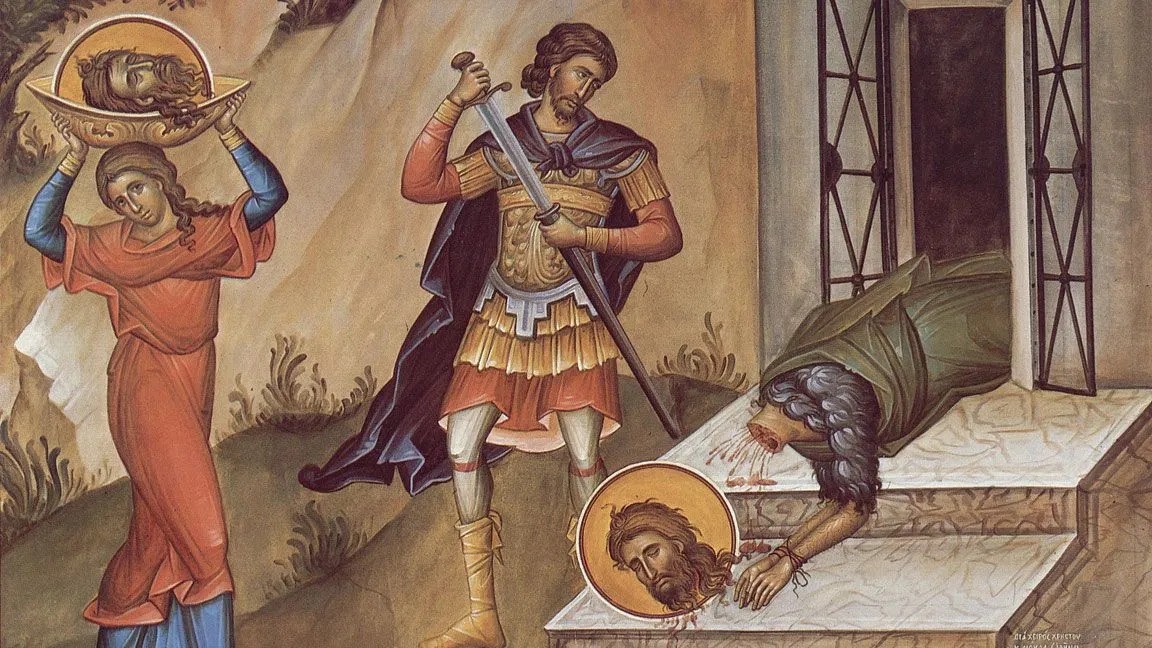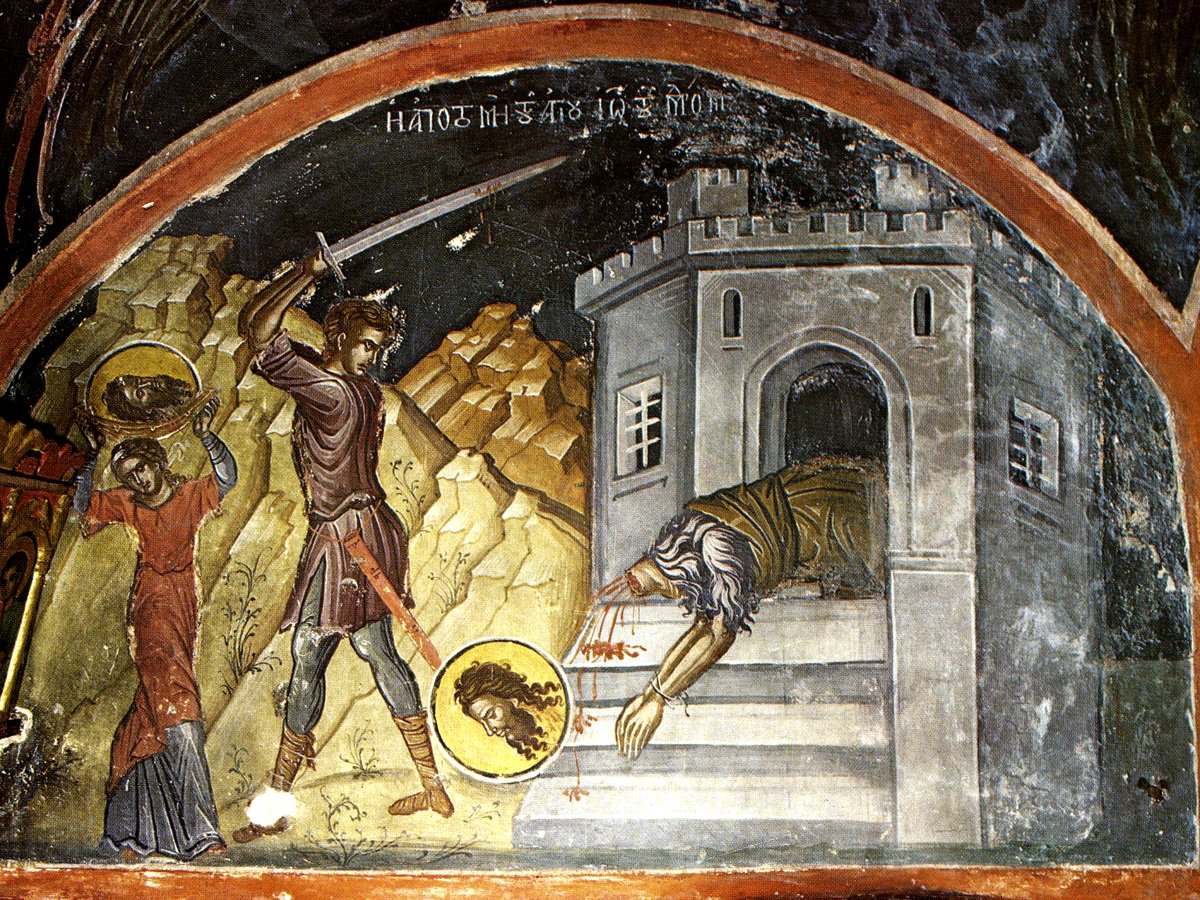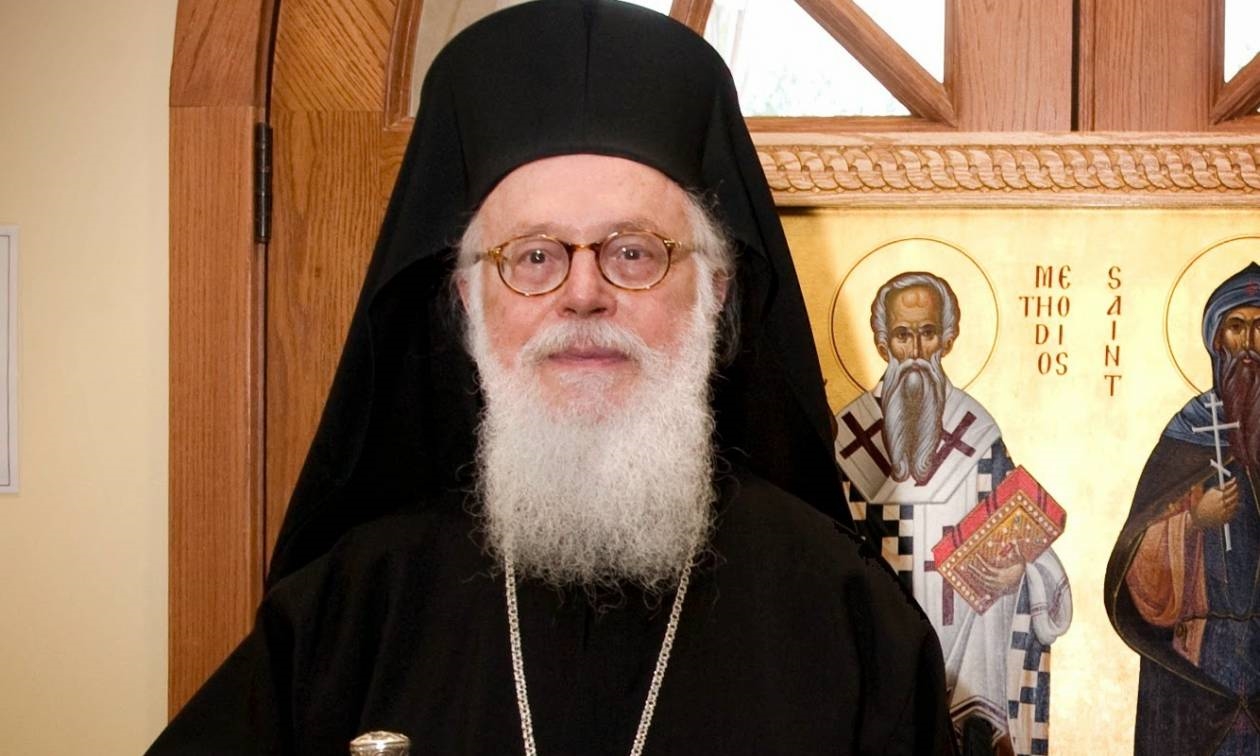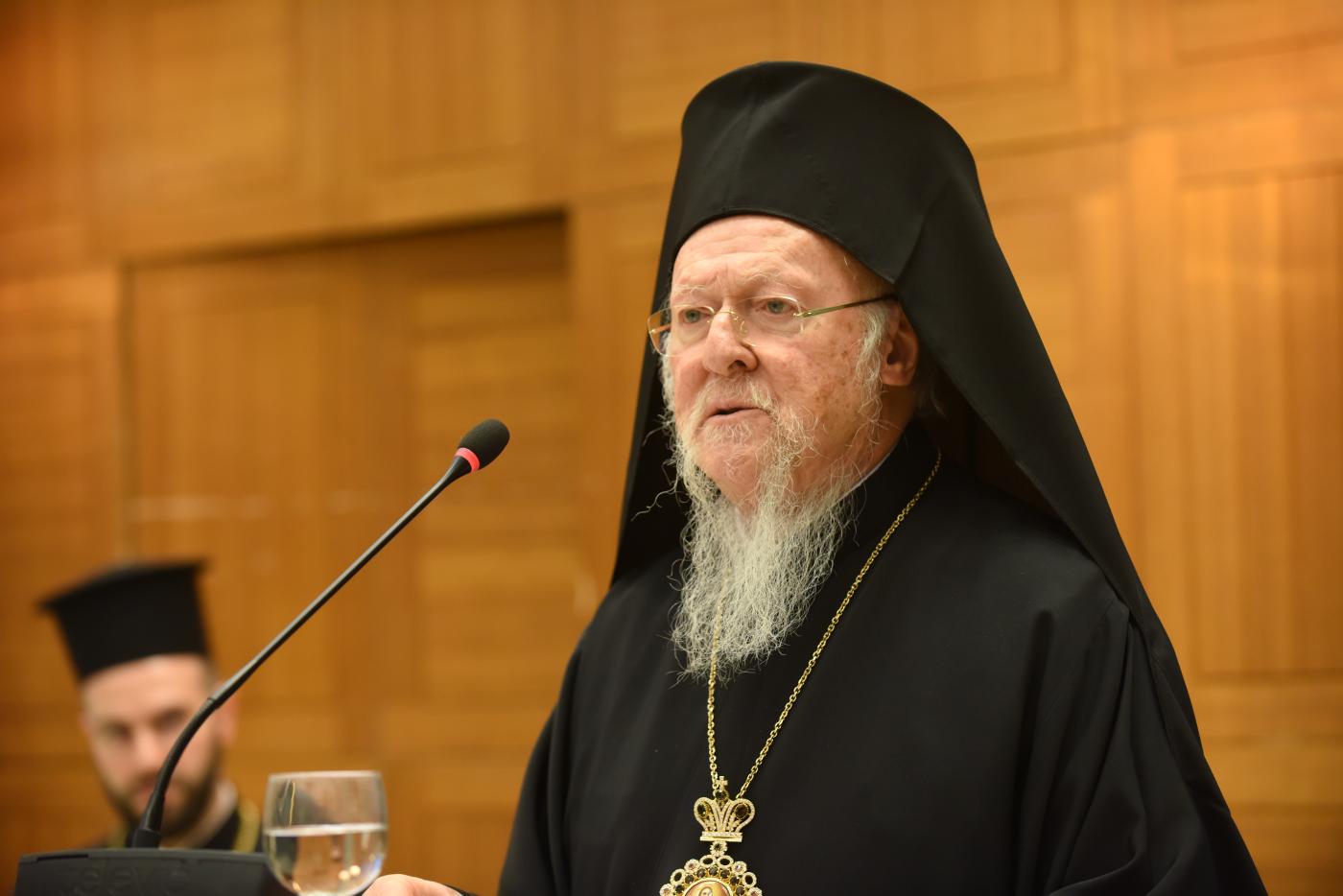The Beheading of the Holy Glorious Prophet, Forerunner, and Baptist John (29 August)


The Beheading of the Prophet, Forerunner of the Lord, John the Baptist: The Evangelists Matthew (Mt.14:1-12) and Mark (Mark 6:14-29) provide accounts about the martyric end of John the Baptist in the year 32 after the Birth of Christ.
Following the Baptism of the Lord, Saint John the Baptist was locked up in prison by Herod Antipas, the Tetrarch (ruler of one fourth of the Holy Land) and governor of Galilee. (After the death of king Herod the Great, the Romans divided the territory of Palestine into four parts, and put a governor in charge of each part. Herod Antipas received Galilee from the emperor Augustus).
The prophet of God John openly denounced Herod for having left his lawful wife, the daughter of the Arabian king Aretas, and then instead cohabiting with Herodias, the wife of his brother Philip (Luke 3:19-20). On his birthday, Herod made a feast for dignitaries, the elders and a thousand chief citizens. Salome, the daughter of Herod, danced before the guests and charmed Herod. In gratitude to the girl, he swore to give her whatever she would ask, up to half his kingdom.
The vile girl on the advice of her wicked mother Herodias asked that she be given the head of John the Baptist on a platter. Herod became apprehensive, for he feared the wrath of God for the murder of a prophet, whom earlier he had heeded. He also feared the people, who loved the holy Forerunner. But because of the guests and his careless oath, he gave orders to cut off the head of Saint John and to give it to Salome.
According to Tradition, the mouth of the dead preacher of repentance once more opened and proclaimed: “Herod, you should not have the wife of your brother Philip.” Salome took the platter with the head of Saint John and gave it to her mother. The frenzied Herodias repeatedly stabbed the tongue of the prophet with a needle and buried his holy head in a unclean place. But the pious Joanna, wife of Herod’s steward Chuza, buried the head of John the Baptist in an earthen vessel on the Mount of Olives, where Herod had a parcel of land. (The Uncovering of the Venerable Head is celebrated February 24). The holy body of John the Baptist was taken that night by his disciples and buried at Sebastia, there where the wicked deed had been done.
After the murder of Saint John the Baptist, Herod continued to govern for a certain time. Pontius Pilate, governor of Judea, later sent Jesus Christ to him, Whom he mocked (Luke 23:7-12).
The judgment of God came upon Herod, Herodias and Salome, even during their earthly life. Salome, crossing the River Sikoris in winter, fell through the ice. The ice gave way in such a way that her body was in the water, but her head was trapped above the ice. It was similar to how she once had danced with her feet upon the ground, but now she flailed helplessly in the icy water. Thus she was trapped until that time when the sharp ice cut through her neck.
Her corpse was not found, but they brought the head to Herod and Herodias, as once they had brought them the head of Saint John the Baptist. The Arab king Aretas, in revenge for the disrespect shown his daughter, made war against Herod. The defeated Herod suffered the wrath of the Roman emperor Caius Caligua (37-41) and was exiled with Herodias first to Gaul, and then to Spain.


The Beheading of Saint John the Baptist, a Feast day established by the Church, is also a strict fast day because of the grief of Christians at the violent death of the saint. In some Orthodox cultures pious people will not eat food from a flat plate, use a knife, or eat food that is round in shape on this day.
The divine Baptist, the Prophet born of a Prophet, the seal of all the Prophets and beginning of the Apostles, the mediator between the Old and New Covenants, the voice of one crying in the wilderness, the God-sent Messenger of the incarnate Messiah, the forerunner of Christ’s coming into the world (Esaias 40: 3; Mal. 3: 1); who by many miracles was both conceived and born; who was filled with the Holy Spirit while yet in his mother’s womb; who came forth like another Elias the Zealot, whose life in the wilderness and divine zeal for God’s Law he imitated: this divine Prophet, after he had preached the baptism of repentance according to God’s command; had taught men of low rank and high how they must order their lives; had admonished those whom he baptized and had filled them with the fear of God, teaching them that no one is able to escape the wrath to come if he do not works worthy of repentance; had, through such preaching, prepared their hearts to receive the evangelical teachings of the Savior; and finally, after he had pointed out to the people the very Savior, and said, “Behold the Lamb of God, Which taketh away the sin of the world” (Luke 3:2-18; John 1: 29-36), after all this, John sealed with his own blood the truth of his words and was made a sacred victim for the divine Law at the hands of a transgressor.
This was Herod Antipas, the Tetrarch of Galilee, the son of Herod the Great. This man had a lawful wife, the daughter of Arethas (or Aretas), the King of Arabia (that is, Arabia Petraea, which had the famous Nabatean stone city of Petra as its capital. This is the Aretas mentioned by Saint Paul in II Cor. 11:32). Without any cause, and against every commandment of the Law, he put her away and took to himself Herodias, the wife of his brother Philip, to whom Herodias had borne a daughter, Salome. He would not desist from this unlawful union even when John, the preacher of repentance, the bold and austere accuser of the lawless, censured him and told him, “It is not lawful for thee to have thy brother’s wife” (Mark 6: 18). Thus Herod, besides his other unholy acts, added yet this, that he apprehended John and shut him in prison; and perhaps he would have killed him straightway, had he not feared the people, who had extreme reverence for John. Certainly, in the beginning, he himself had great reverence for this just and holy man. But finally, being pierced with the sting of a mad lust for the woman Herodias, he laid his defiled hands on the teacher of purity on the very day he was celebrating his birthday. When Salome, Herodias’ daughter, had danced in order to please him and those who were supping with him, he promised her — with an oath more foolish than any foolishness — that he would give her anything she asked, even unto the half of his kingdom. And she, consulting with her mother, straightway asked for the head of John the Baptist in a charger. Hence this transgressor of the Law, preferring his lawless oath above the precepts of the Law, fulfilled this godless promise and filled his loathsome banquet with the blood of the Prophet. So it was that that all-venerable head, revered by the Angels, was given as a prize for an abominable dance, and became the plaything of the dissolute daughter of a debauched mother. As for the body of the divine Baptist, it was taken up by his disciples and placed in a tomb (Mark 6: 21 – 29). Concerning the finding of his holy head, see February 24 and May 25.
Herod Antipas (son of the elder Herod who slew the children of Bethlehem at the time of Christ’s birth) was ruler of Galilee when John the Baptist was preaching. He was married to the daughter of Aretas, an Arabian prince. But Herod, an evil sprout of an evil root, put away his lawful wife and unlawfully took Herodias as his concubine. Herodias was the wife of his brother Philip, who was still alive. John the Baptist stood up against this lawlessness and strongly denounced Herod. Herod then cast John into prison. During a banquet in his court at Sebastia in Galilee, Salome–the daughter of Herodias and Philip–danced before the guests. Herod, drunk with wine, was so taken by this dance that he promised Salome anything she asked of him, even if it were half of his kingdom. Salome was persuaded by Herodias to ask for the head of John the Baptist. Herod gave the order, and John was beheaded in prison–and his head was presented to him on a platter. John’s disciples took the body of their teacher by night and honorably buried it, but Herodias pierced John’s tongue with a needle repeadedly, and buried his head in an unclean place. What later happened to John the Baptist’s head can be read on February 24. However, God’s punishment quickly befell this group of evildoers. Prince Aretas, avenging his daughter’s honor, waged war against Herod with his army and defeated him. The defeated Herod was sentenced by the Roman Caesar, Caligula, to exile (at first to Gaul, then later to Spain). Herod and Herodias lived in poverty and humiliation in exile, until the earth opened up and swallowed them. Salome died an evil death on the Sikaris (Sula) River (see “Reflection” below). St. John’s beheading occurred just before Passover [the Pascha] but its celebration on August 29 was established because a church that had been built over his grave in Sebastia (by Emperor Constantine and Empress Helena) was consecrated on August 29. The relics of John’s disciples, Eliseus and Audius, were also placed in that church.
Apolytikion of Beheading of the Forerunner
Second Tone
The memory of the just is celebrated with hymns of praise, but the Lord’s testimony is sufficient for thee, O Forerunner; for thou hast proved to be truly even more venerable than the Prophets, since thou was granted to baptize in the running waters Him Whom they proclaimed. Wherefore, having contested for the truth, thou didst rejoice to announce the good tidings even to those in Hades: that God hath appeared in the flesh, taking away the sin of the world and granting us great mercy.
Kontakion of Beheading of the Forerunner
Plagal of the First Tone
The glorious beheading of the Forerunner was a certain divine dispensation, that the coming of the Saviour might also be preached to those in Hades. Let Herodias lament, then, that she demanded a wicked murder; for she loved not the Law of God, nor eternal life, but one false and fleeting.
Source: oca.org / goarch.org / westserbdio.org




